
English Prepositions: familiar with/to, famous for, fond of,...
2K views · Feb 25, 2023 englishteststore.net
Quizzes on English Prepositions will help you practice your English prepositions. Familiar with/to, famous for, fond of, forgetful of, free of, good at, greedy for, ill with, independent of

English Prepositions: innocent of, jealous of, about/for/on,...
6K views · Feb 25, 2023 englishteststore.net
Quizzes on English Prepositions will help you practice your English prepositions: innocent of, jealous of, about/for/on, made of/from, negligent of, new to, opposed to sth/sbd, offended with sbd

English Prepositions: pleasant by, qualified for, ready for,...
1K views · Feb 26, 2023 englishteststore.net
Quizzes on English Prepositions will help you practice your English prepositions: pleasant by, qualified for, ready for, sure of, tired of, die of, story of, in spite of, advantage of.

English Prepositions: In want of, In time of, Live on, On fo...
8K views · Feb 26, 2023 englishteststore.net
Quizzes on English Prepositions will help you practice your English prepositions: In want of, In time of, Live on, On foot, Off food, On horseback, Forward to

English Prepositions: By mistake, Attention to, In general, ...
5K views · Feb 27, 2023 englishteststore.net
Quizzes on English Prepositions will help you practice your English prepositions: By mistake, Attention to, In general, Learn/study by heart, Out of date, matter with

English Prepositions: Belong to, Wait for, Succeed in, Liste...
828 views · Feb 27, 2023 englishteststore.net
Quizzes on English Prepositions will help you practice your English prepositions: Belong to, Wait for, Succeed in, Listen to, Aim at, Care for, Complain with, Complain of, Look after

English Prepositions: Looking for, Look at, Tell about, Trou...
281 views · Feb 27, 2023 englishteststore.net
Quizzes on English Prepositions will help you practice your English prepositions: Looking for, Look at, Tell about, Trouble with, Respect for, Wonder about, Keep away from, Treat somebody to

English Prepositions: Answer to, Accuse of, Spend on, Waste...
2K views · Feb 27, 2023 englishteststore.net
Quizzes on English Prepositions will help you practice your English prepositions: Answer to, Accuse of, Spend on, Waste on, Popular with, Beneficent to, Contrary to

English Prepositions: Gallant to, Bad at, Adhere to, Offende...
2K views · Feb 27, 2023 englishteststore.net
Quizzes on English Prepositions will help you practice your English prepositions: Gallant to, Bad at, Important to, Offended by/at, Shock at, Indifferent to, Adhere to, Agree with

English Prepositions: Bring with, After all, Related to, Get...
663 views · Feb 27, 2023 englishteststore.net
Quizzes on English Prepositions will help you practice your English prepositions: Bring with, After all, Related to, Get married to, Engaged to, intended for, Acquainted with

English Prepositions: Smile at, Delightful to, Interesting t...
2K views · Feb 27, 2023 englishteststore.net
Quizzes on English Prepositions will help you practice your English prepositions: Smile at, Delightful to, Interesting to, good to, Go for a walk, In favor of, In connection with, In front of

English Prepositions Quiz 23
10K views · Feb 28, 2023 englishteststore.net
Quizzes on English Prepositions will help you practice your English prepositions:

English Prepositions Quiz 12
19K views · Feb 27, 2023 englishteststore.net
Quizzes on English Prepositions will help you practice your English prepositions:

English Prepositions Quiz 13
11K views · Feb 27, 2023 englishteststore.net
Quizzes on English Prepositions will help you practice your English prepositions:

English Prepositions Quiz 14
6K views · Feb 27, 2023 englishteststore.net
Quizzes on English prepositions will help you practice your English prepositions.

English Prepositions Quiz 15
7K views · Feb 27, 2023 englishteststore.net
Quizzes on English prepositions will help you practice your English prepositions:

English Prepositions Quiz 24
14K views · Feb 28, 2023 englishteststore.net
Quizzes on English Prepositions will help you practice your English prepositions

English Prepositions Quiz 16
24K views · Feb 27, 2023 englishteststore.net
Quizzes on English Prepositions will help you practice your English prepositions:

English Prepositions Quiz 17
14K views · Feb 27, 2023 englishteststore.net
Quizzes on English Prepositions will help you practice your English prepositions:

English Prepositions Quiz 18
1K views · Feb 27, 2023 englishteststore.net
Quizzes on English Prepositions will help you practice your English prepositions

English Prepositions Quiz 19
4K views · Feb 27, 2023 englishteststore.net
Quizzes on English Prepositions will help you practice your English prepositions:

English Prepositions Quiz 20
7K views · Feb 27, 2023 englishteststore.net
Quizzes on English Prepositions will help you practice your English prepositions:

English Prepositions Quiz 21
8K views · Feb 27, 2023 englishteststore.net
Quizzes on English Prepositions will help you practice your English prepositions:

English Prepositions Quiz 22
5K views · Feb 27, 2023 englishteststore.net
Quizzes on English Prepositions will help you practice your English prepositions:

English Prepositions Quiz 25
2K views · Mar 5, 2023 englishteststore.net
Quizzes on English Prepositions will help you practice your English prepositions

English Prepositions Quiz 26
3K views · Mar 5, 2023 englishteststore.net
Quizzes on English Prepositions will help you practice your English prepositions:

English Prepositions Quiz 26
3K views · Mar 5, 2023 englishteststore.net
Quizzes on English Prepositions will help you practice your English prepositions:

English Prepositions Quiz 28
3K views · Mar 7, 2023 englishteststore.net
Quizzes on English Prepositions will help you practice your English prepositions

English Prepositions Quiz 27
3K views · Mar 5, 2023 englishteststore.net
Quizzes on English Prepositions will help you practice your English prepositions

English Prepositions Quiz 29
1K views · Mar 7, 2023 englishteststore.net
Quizzes on English Prepositions will help you practice your English prepositions

English Prepositions Quiz 30
2K views · Mar 7, 2023 englishteststore.net
Quizzes on English Prepositions will help you practice your English prepositions

English Prepositions Quiz 31
2K views · Mar 9, 2023 englishteststore.net
Quizzes on English Prepositions will help you practice your English prepositions
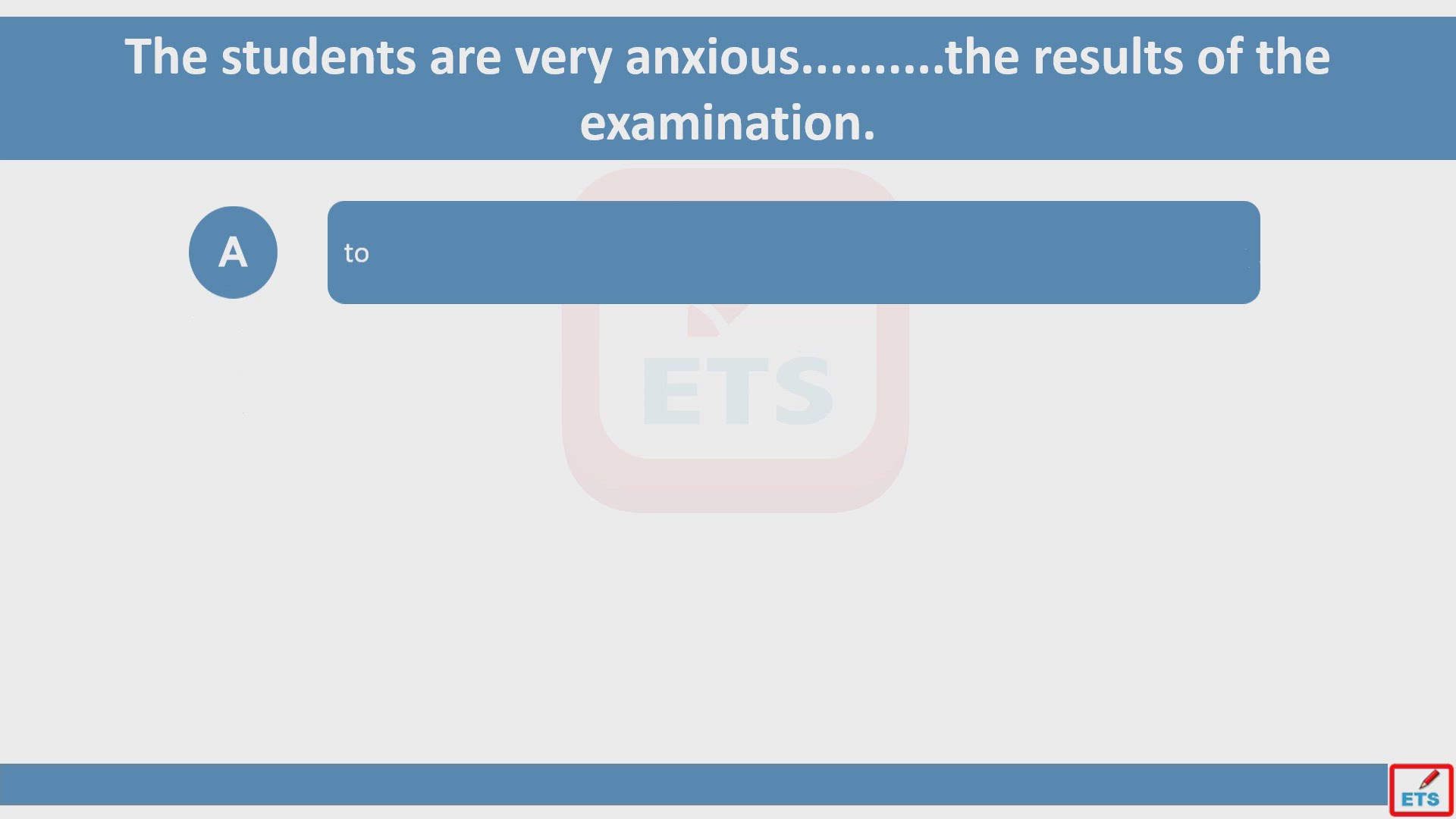
English Prepositions Quiz 32
5K views · Mar 9, 2023 englishteststore.net
Quizzes on English Prepositions will help you practice your English prepositions

English Prepositions Quiz 33
2K views · Mar 15, 2023 englishteststore.net
Quizzes on English Prepositions will help you practice your English prepositions

English Prepositions Quiz 34
5K views · Mar 16, 2023 englishteststore.net
Quizzes on English Prepositions will help you practice your English prepositions

English Prepositions Quiz 35
3K views · Mar 16, 2023 englishteststore.net
Quizzes on English Prepositions will help you practice your English prepositions

English Prepositions Quiz 36
474 views · Mar 17, 2023 englishteststore.net
Quizzes on English Prepositions will help you practice your English prepositions

English Prepositions Quiz 37
9K views · Mar 18, 2023 englishteststore.net
Quizzes on English Prepositions will help you practice your English prepositions:

English Prepositions Quiz 46
11K views · Mar 28, 2023 englishteststore.net
This video helps you learn English prepositions. You can practice English prepositions online by taking the test at https://englishteststore.net/index.php?option=com_content&view=article&id=320&Itemid=231 Thank you for watching! Please subscribe, share and like the video. EnglishTestStore ►https://englishteststore.net/ Facebook ►https://www.facebook.com/englishteststore.net/ Twitter ►https://twitter.com/englishteststor

English Prepositions Quiz 46
11K views · Mar 28, 2023 englishteststore.net
This video helps you learn English prepositions. You can practice English prepositions online by taking the test at https://englishteststore.net/index.php?option=com_content&view=article&id=320&Itemid=231 Thank you for watching! Please subscribe, share and like the video. EnglishTestStore ►https://englishteststore.net/ Facebook ►https://www.facebook.com/englishteststore.net/ Twitter ►https://twitter.com/englishteststor
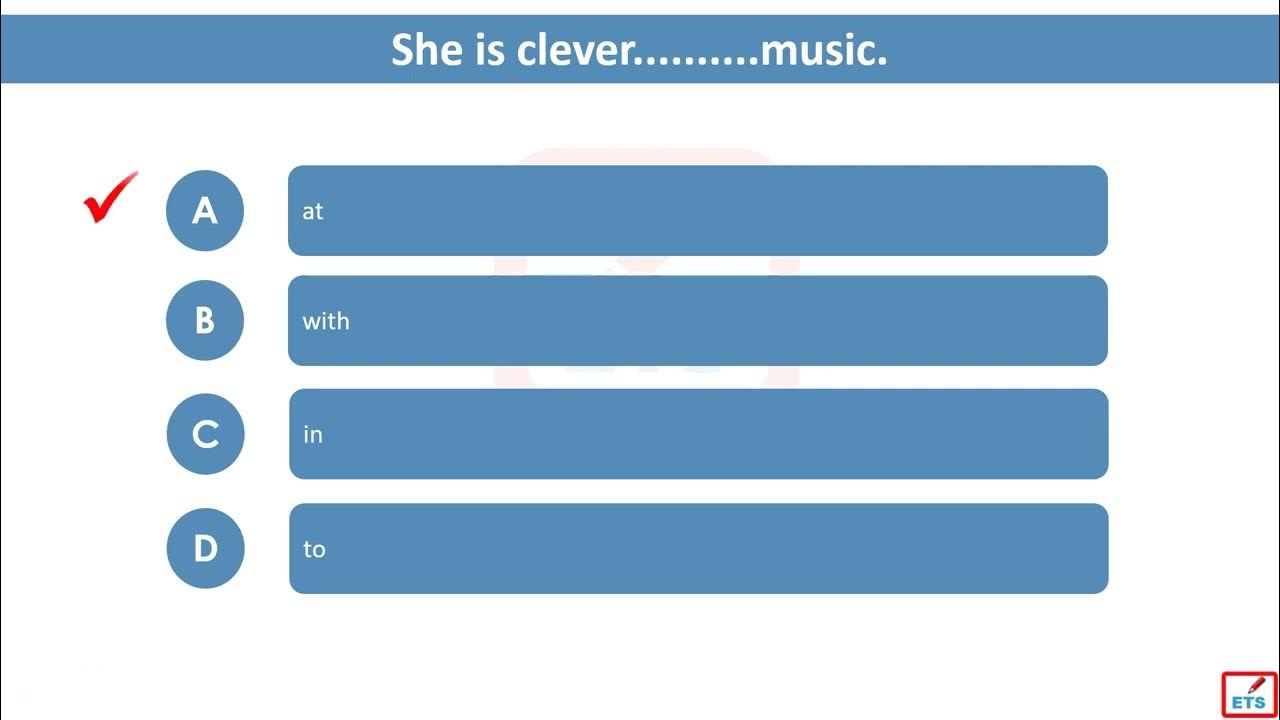
English Prepositions Quiz 45English Verb Tenses:
15K views · Mar 28, 2023 englishteststore.net
This video helps you learn English prepositions. You can practice English prepositions online by taking the test at https://englishteststore.net/index.php?option=com_content&view=article&id=320&Itemid=231 Thank you for watching! Please subscribe, share and like the video. EnglishTestStore ►https://englishteststore.net/ Facebook ►https://www.facebook.com/englishteststore.net/ Twitter ►https://twitter.com/englishteststor
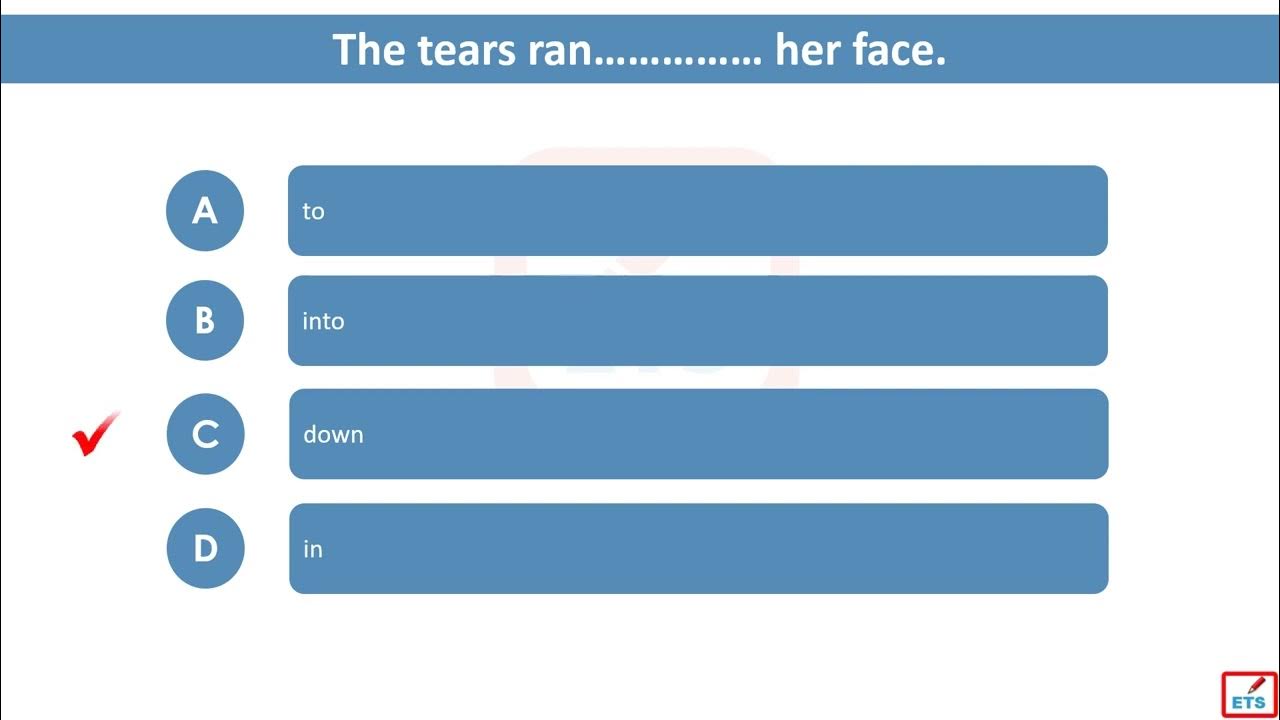
English Prepositions Quiz 44
14K views · Mar 28, 2023 englishteststore.net
This video helps you learn English prepositions. You can practice English prepositions online by taking the test at https://englishteststore.net/index.php?option=com_content&view=article&id=320&Itemid=231 Thank you for watching! Please subscribe, share and like the video. EnglishTestStore ►https://englishteststore.net/ Facebook ►https://www.facebook.com/englishteststore.net/ Twitter ►https://twitter.com/englishteststor
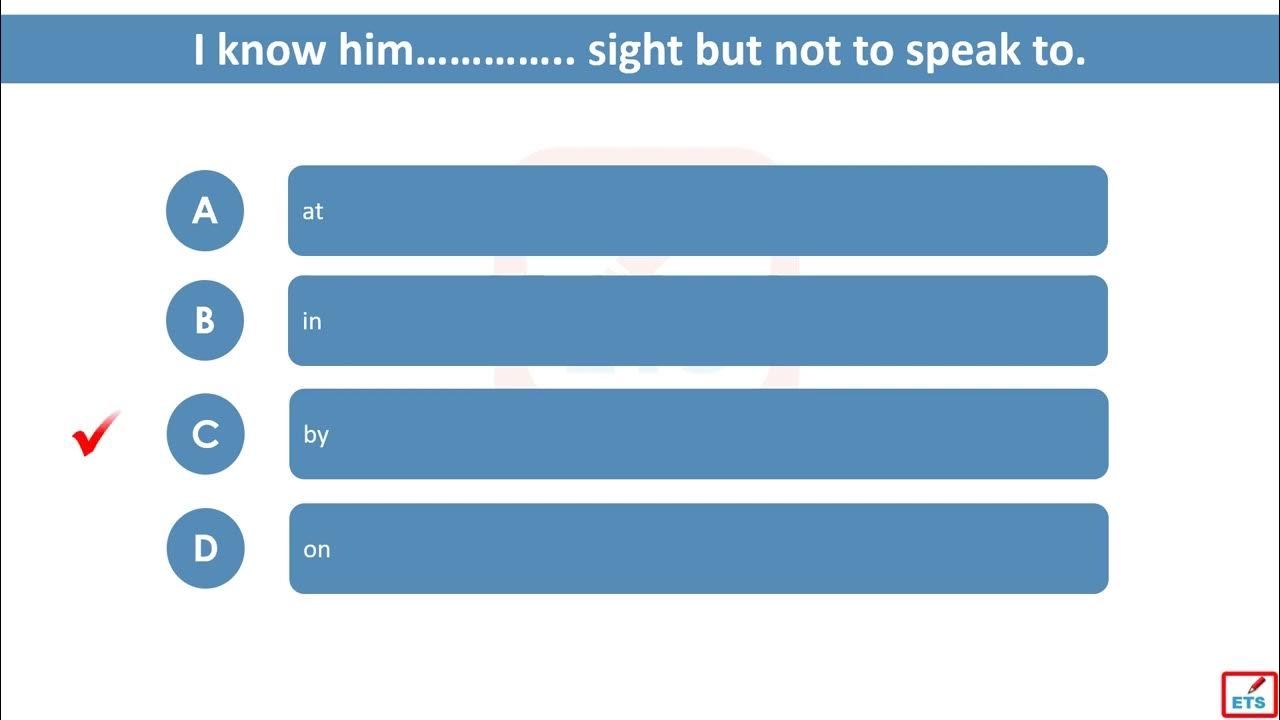
English Prepositions Quiz 43
10K views · Mar 28, 2023 englishteststore.net
This video helps you learn English prepositions. You can practice English prepositions online by taking the test at https://englishteststore.net/index.php?option=com_content&view=article&id=320&Itemid=231 Thank you for watching! Please subscribe, share and like the video. EnglishTestStore ►https://englishteststore.net/ Facebook ►https://www.facebook.com/englishteststore.net/ Twitter ►https://twitter.com/englishteststor

English Prepositions Quiz 42
5K views · Mar 28, 2023 englishteststore.net
This video helps you learn English prepositions. You can practice English prepositions online by taking the test at https://englishteststore.net/index.php?option=com_content&view=article&id=320&Itemid=231 Thank you for watching! Please subscribe, share and like the video. EnglishTestStore ►https://englishteststore.net/ Facebook ►https://www.facebook.com/englishteststore.net/ Twitter ►https://twitter.com/englishteststor
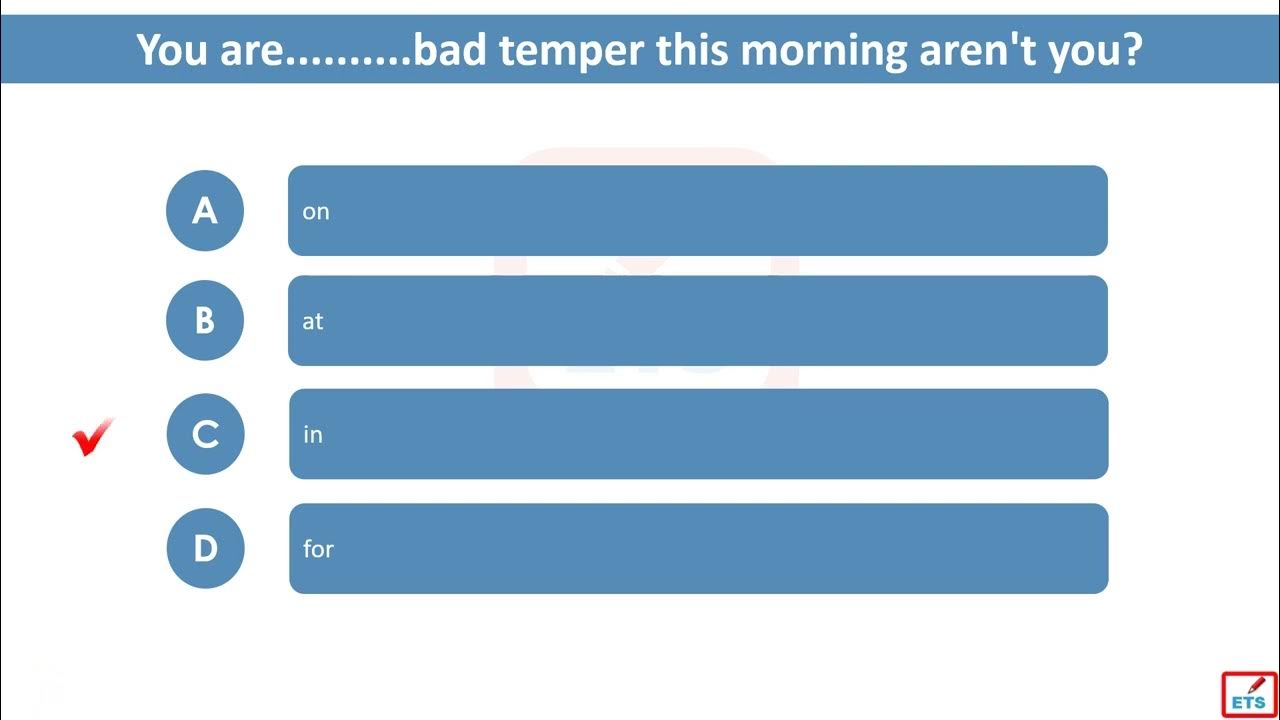
English Verb Tenses: English Prepositions Quiz 41
6K views · Mar 28, 2023 englishteststore.net
This video helps you learn English prepositions. You can practice English prepositions online by taking the test at https://englishteststore.net/index.php?option=com_content&view=article&id=320&Itemid=231 Thank you for watching! Please subscribe, share and like the video. EnglishTestStore ►https://englishteststore.net/ Facebook ►https://www.facebook.com/englishteststore.net/ Twitter ►https://twitter.com/englishteststor
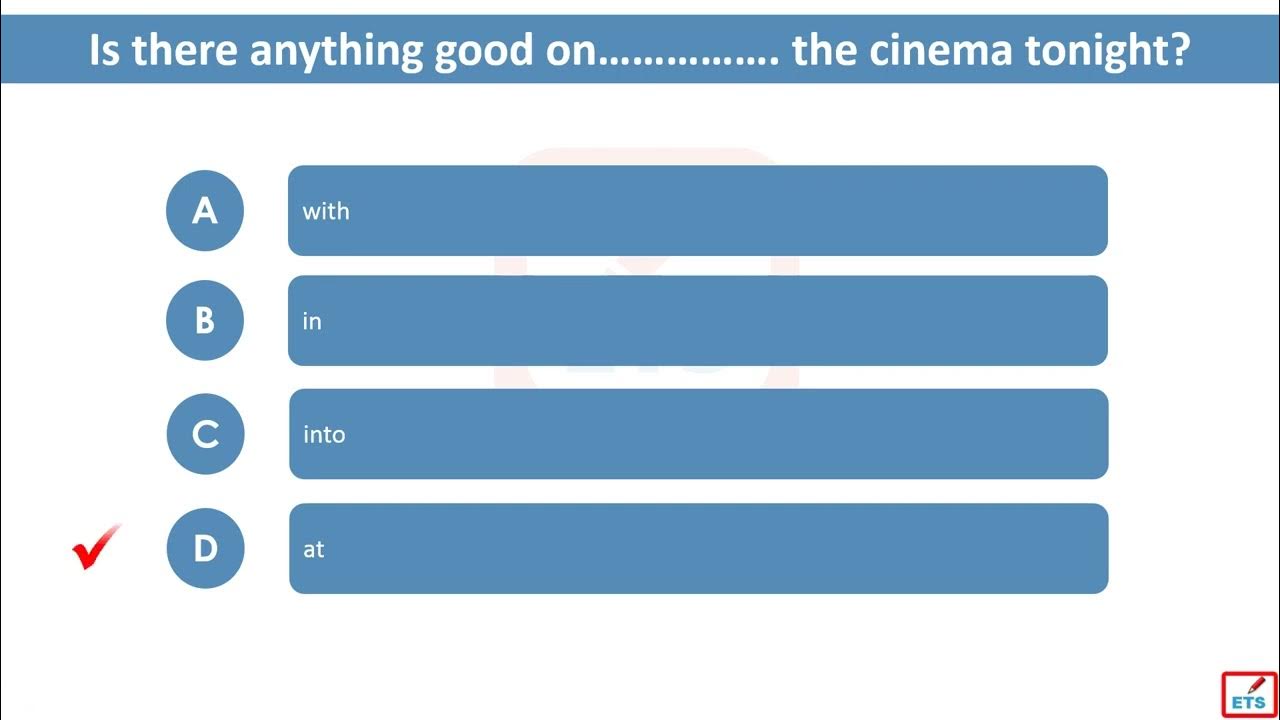
English Verb Tenses: English Prepositions Quiz 40
7K views · Mar 28, 2023 englishteststore.net
This video helps you learn English prepositions. You can practice English prepositions online by taking the test at https://englishteststore.net/index.php?option=com_content&view=article&id=320&Itemid=231 Thank you for watching! Please subscribe, share and like the video. EnglishTestStore ►https://englishteststore.net/ Facebook ►https://www.facebook.com/englishteststore.net/ Twitter ►https://twitter.com/englishteststor
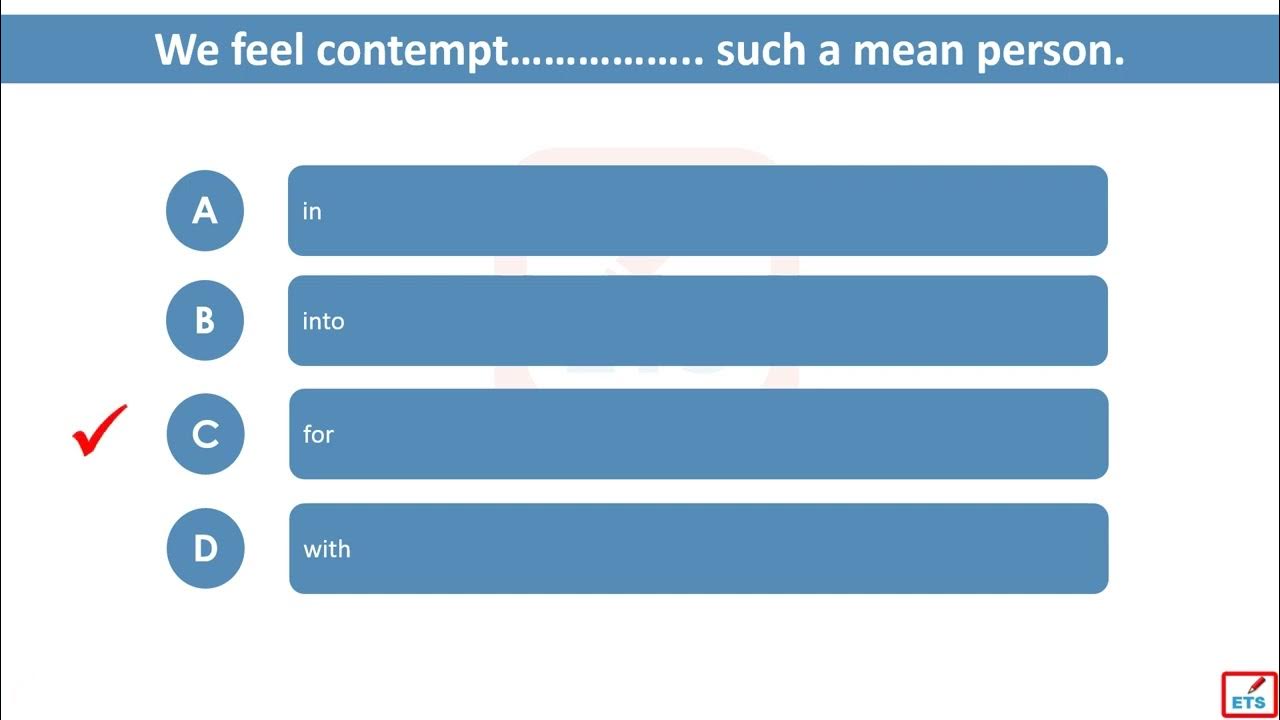
English Verb Tenses: English Prepositions Quiz 39
8K views · Mar 28, 2023 englishteststore.net
This video helps you learn English prepositions. You can practice English prepositions online by taking the test at https://englishteststore.net/index.php?option=com_content&view=article&id=320&Itemid=231 Thank you for watching! Please subscribe, share and like the video. EnglishTestStore ►https://englishteststore.net/ Facebook ►https://www.facebook.com/englishteststore.net/ Twitter ►https://twitter.com/englishteststor

English Prepositions Quiz 48
4K views · Mar 29, 2023 englishteststore.net
This video helps you learn English prepositions. You can practice English prepositions online by taking the test at https://englishteststore.net/index.php?option=com_content&view=article&id=320&Itemid=231 Thank you for watching! Please subscribe, share and like the video. EnglishTestStore ►https://englishteststore.net/ Facebook ►https://www.facebook.com/englishteststore.net/ Twitter ►https://twitter.com/englishteststor

English Prepositions Quiz 49
4K views · Mar 29, 2023 englishteststore.net
This video helps you learn English prepositions. You can practice English prepositions online by taking the test at https://englishteststore.net/index.php?option=com_content&view=article&id=320&Itemid=231 Thank you for watching! Please subscribe, share and like the video. EnglishTestStore ►https://englishteststore.net/ Facebook ►https://www.facebook.com/englishteststore.net/ Twitter ►https://twitter.com/englishteststor

English Prepositions Quiz 50
4K views · Mar 29, 2023 englishteststore.net
This video helps you learn English prepositions. You can practice English prepositions online by taking the test at https://englishteststore.net/index.php?option=com_content&view=article&id=320&Itemid=231 Thank you for watching! Please subscribe, share and like the video. EnglishTestStore ►https://englishteststore.net/ Facebook ►https://www.facebook.com/englishteststore.net/ Twitter ►https://twitter.com/englishteststor

English Prepositions Quiz 47
3K views · Mar 29, 2023 englishteststore.net
This video helps you learn English prepositions. You can practice English prepositions online by taking the test at https://englishteststore.net/index.php?option=com_content&view=article&id=320&Itemid=231 Thank you for watching! Please subscribe, share and like the video. EnglishTestStore ►https://englishteststore.net/ Facebook ►https://www.facebook.com/englishteststore.net/ Twitter ►https://twitter.com/englishteststor
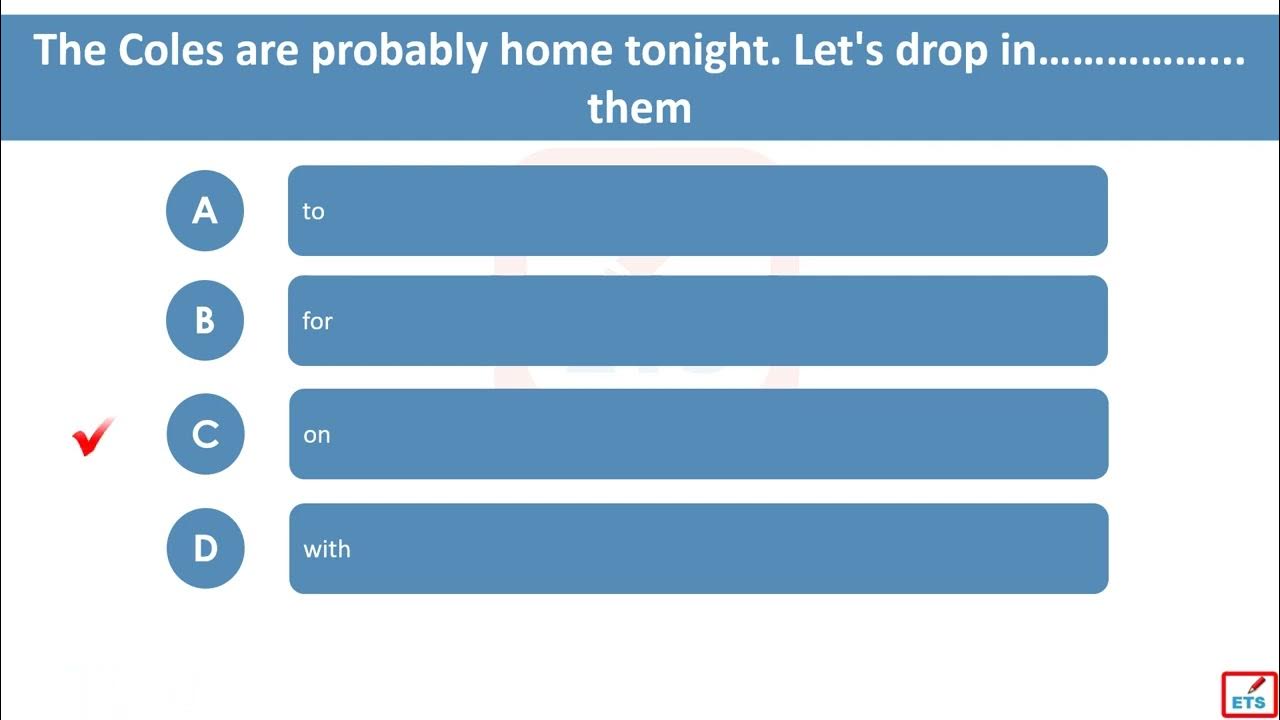
English Prepositions Quiz 51
17K views · Mar 30, 2023 englishteststore.net
This video helps you learn English prepositions. You can practice English prepositions online by taking the test at https://englishteststore.net/index.php?option=com_content&view=article&id=320&Itemid=231 Thank you for watching! Please subscribe, share and like the video. EnglishTestStore ►https://englishteststore.net/ Facebook ►https://www.facebook.com/englishteststore.net/ Twitter ►https://twitter.com/englishteststor

English Prepositions Quiz 56
4K views · Mar 31, 2023 englishteststore.net
This video helps you learn English prepositions. You can practice English prepositions online by taking the test at https://englishteststore.net/index.php?option=com_content&view=article&id=320&Itemid=231 Thank you for watching! Please subscribe, share and like the video. EnglishTestStore ►https://englishteststore.net/ Facebook ►https://www.facebook.com/englishteststore.net/ Twitter ►https://twitter.com/englishteststor

English Prepositions Quiz 57
12K views · Mar 31, 2023 englishteststore.net
This video helps you learn English prepositions. You can practice English prepositions online by taking the test at https://englishteststore.net/index.php?option=com_content&view=article&id=320&Itemid=231 Thank you for watching! Please subscribe, share and like the video. EnglishTestStore ►https://englishteststore.net/ Facebook ►https://www.facebook.com/englishteststore.net/ Twitter ►https://twitter.com/englishteststor
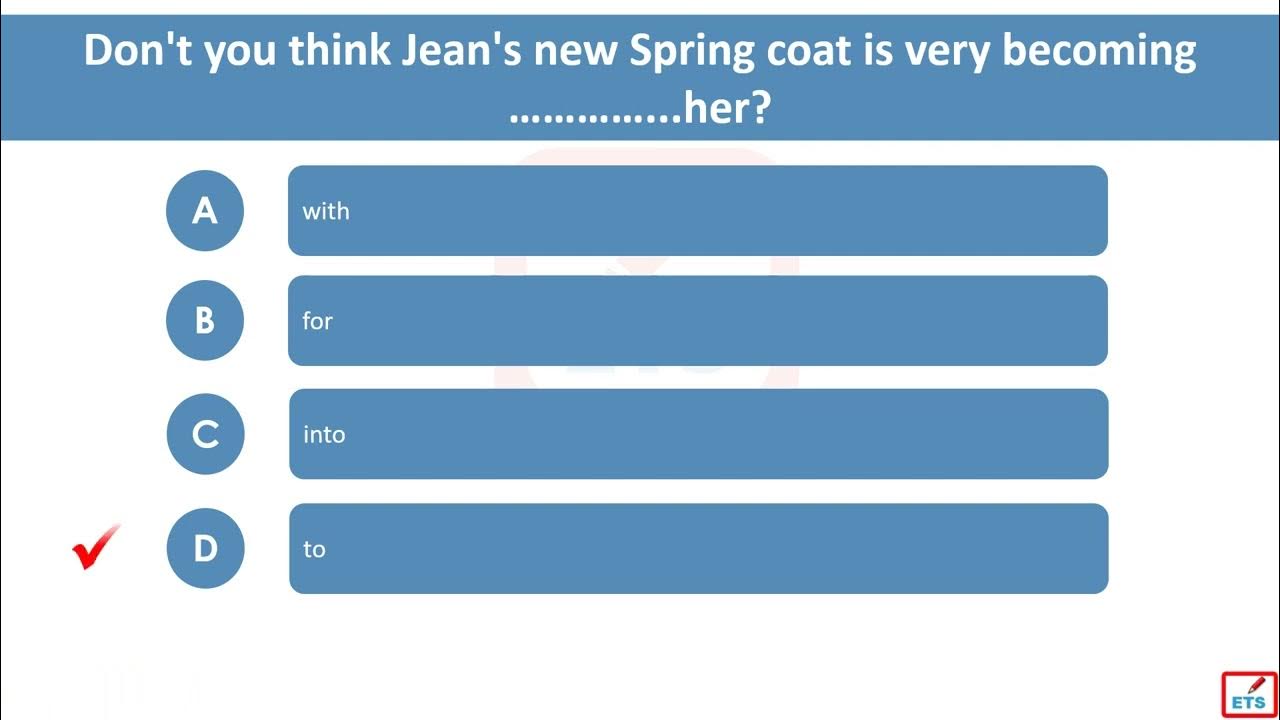
English Verb Tenses: English Prepositions Quiz 58
8K views · Mar 31, 2023 englishteststore.net
This video helps you learn English prepositions. You can practice English prepositions online by taking the test at https://englishteststore.net/index.php?option=com_content&view=article&id=320&Itemid=231 Thank you for watching! Please subscribe, share and like the video. EnglishTestStore ►https://englishteststore.net/ Facebook ►https://www.facebook.com/englishteststore.net/ Twitter ►https://twitter.com/englishteststor
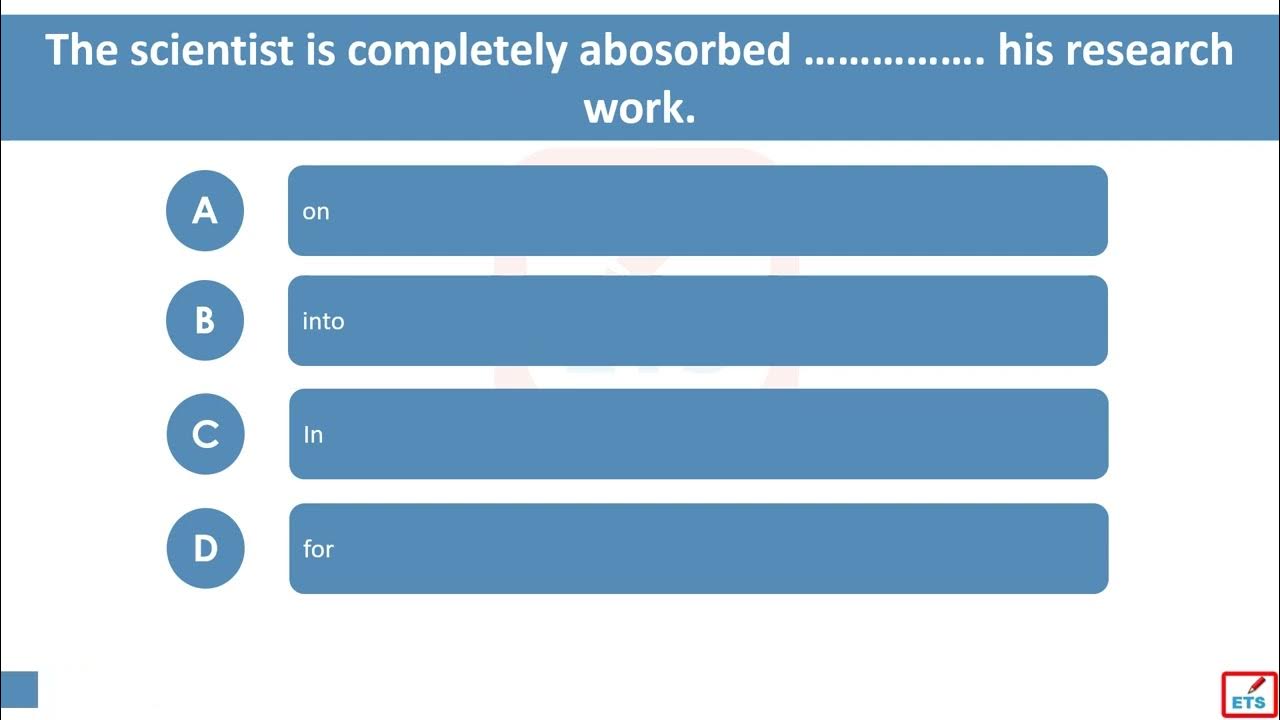
English Verb Tenses: English Prepositions Quiz 59
6K views · Mar 31, 2023 englishteststore.net
This video helps you learn English prepositions. You can practice English prepositions online by taking the test at https://englishteststore.net/index.php?option=com_content&view=article&id=320&Itemid=231 Thank you for watching! Please subscribe, share and like the video. EnglishTestStore ►https://englishteststore.net/ Facebook ►https://www.facebook.com/englishteststore.net/ Twitter ►https://twitter.com/englishteststor
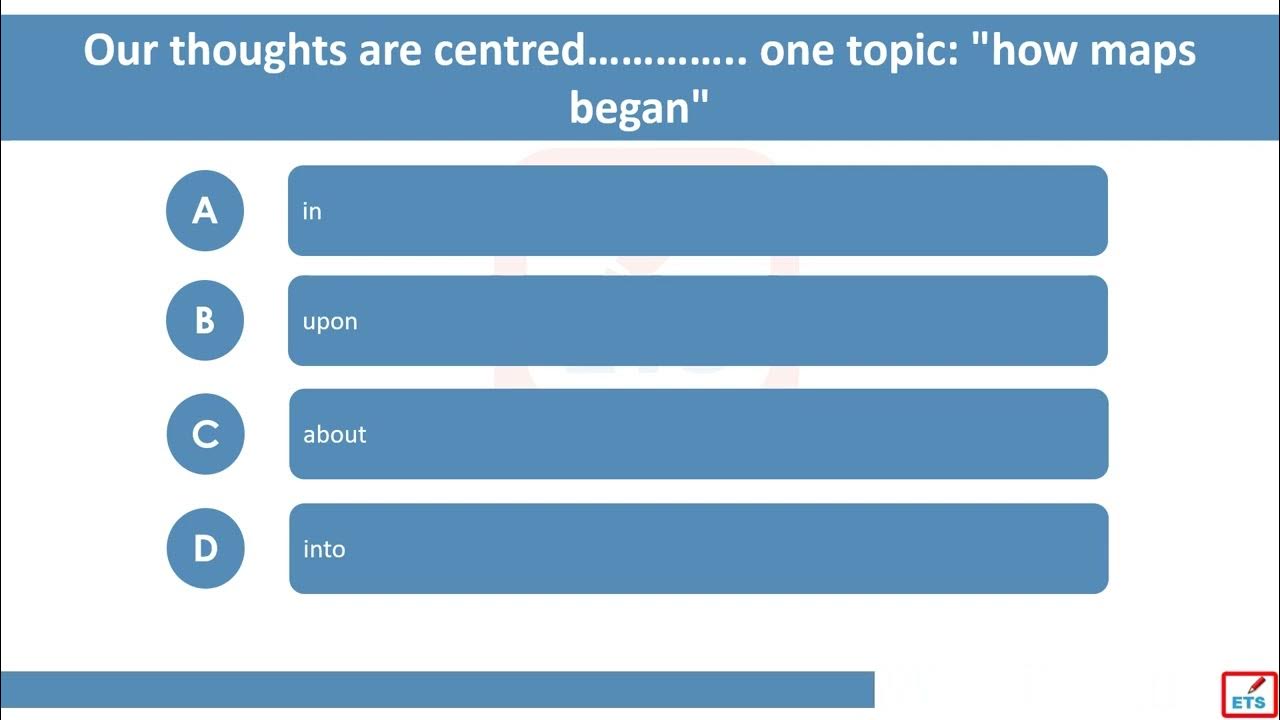
English Prepositions Quiz 60
6K views · Mar 31, 2023 englishteststore.net
This video helps you learn English prepositions. You can practice English prepositions online by taking the test at https://englishteststore.net/index.php?option=com_content&view=article&id=320&Itemid=231 Thank you for watching! Please subscribe, share and like the video. EnglishTestStore ►https://englishteststore.net/ Facebook ►https://www.facebook.com/englishteststore.net/ Twitter ►https://twitter.com/englishteststor
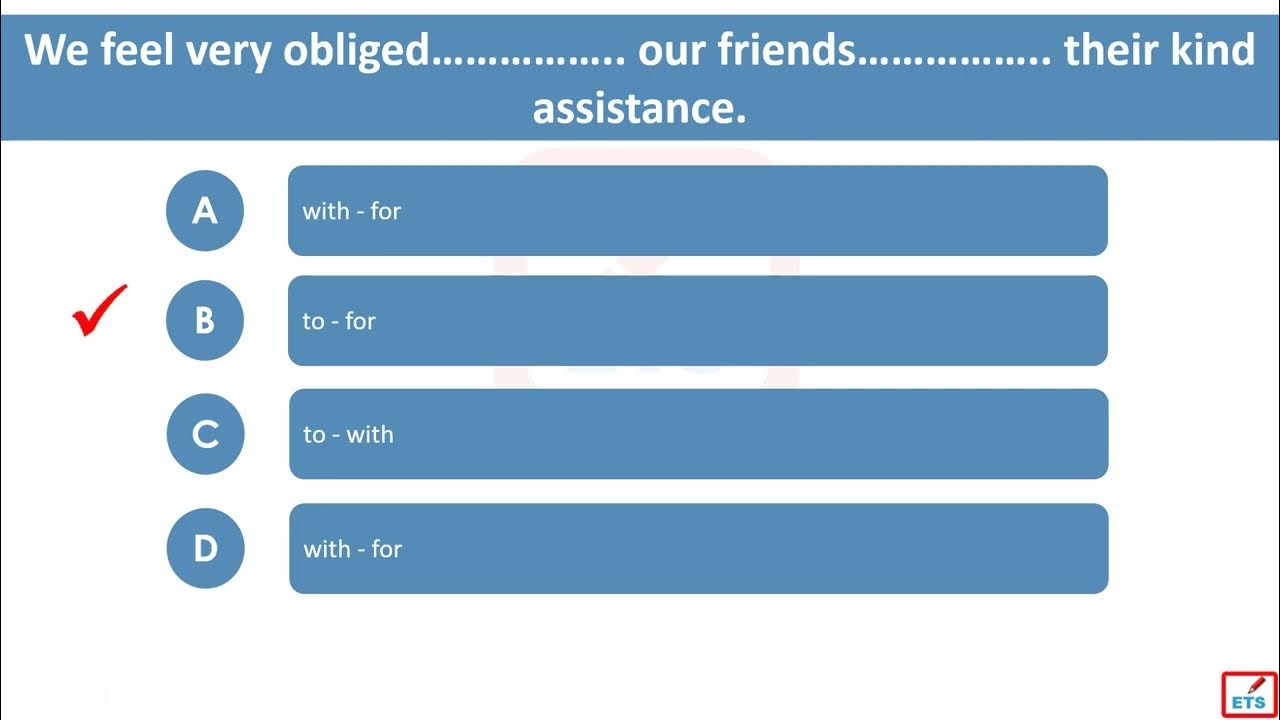
English Prepositions Quiz 55
18K views · Mar 31, 2023 englishteststore.net
This video helps you learn English prepositions. You can practice English prepositions online by taking the test at https://englishteststore.net/index.php?option=com_content&view=article&id=320&Itemid=231 Thank you for watching! Please subscribe, share and like the video. EnglishTestStore ►https://englishteststore.net/ Facebook ►https://www.facebook.com/englishteststore.net/ Twitter ►https://twitter.com/englishteststor

English Prepositions Quiz 54English Verb Tenses:
4K views · Mar 31, 2023 englishteststore.net
This video helps you learn English prepositions. You can practice English prepositions online by taking the test at https://englishteststore.net/index.php?option=com_content&view=article&id=320&Itemid=231 Thank you for watching! Please subscribe, share and like the video. EnglishTestStore ►https://englishteststore.net/ Facebook ►https://www.facebook.com/englishteststore.net/ Twitter ►https://twitter.com/englishteststor

English Prepositions Quiz 53
16K views · Mar 31, 2023 englishteststore.net
This video helps you learn English prepositions. You can practice English prepositions online by taking the test at https://englishteststore.net/index.php?option=com_content&view=article&id=320&Itemid=231 Thank you for watching! Please subscribe, share and like the video. EnglishTestStore ►https://englishteststore.net/ Facebook ►https://www.facebook.com/englishteststore.net/ Twitter ►https://twitter.com/englishteststor
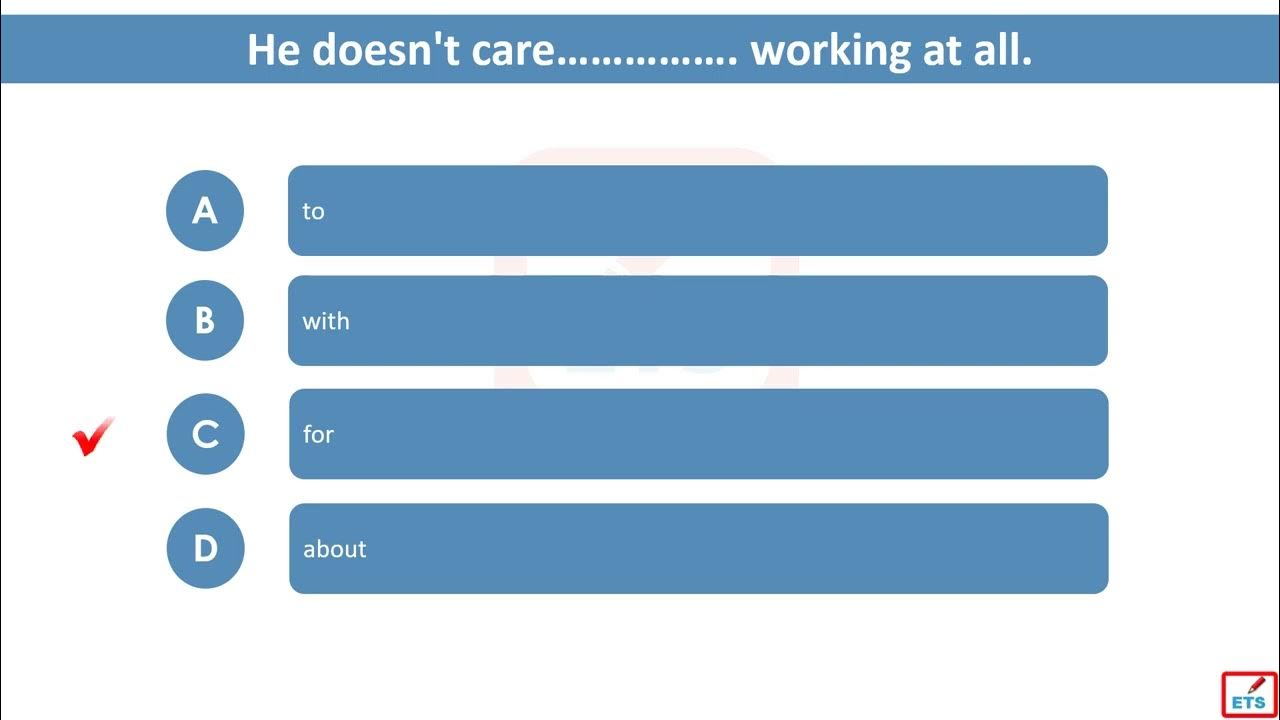
English Prepositions Quiz 52
5K views · Mar 30, 2023 englishteststore.net
This video helps you learn English prepositions. You can practice English prepositions online by taking the test at https://englishteststore.net/index.php?option=com_content&view=article&id=320&Itemid=231 Thank you for watching! Please subscribe, share and like the video. EnglishTestStore ►https://englishteststore.net/ Facebook ►https://www.facebook.com/englishteststore.net/ Twitter ►https://twitter.com/englishteststor

English Prepositions Quiz 51
17K views · Mar 30, 2023 englishteststore.net
This video helps you learn English prepositions. You can practice English prepositions online by taking the test at https://englishteststore.net/index.php?option=com_content&view=article&id=320&Itemid=231 Thank you for watching! Please subscribe, share and like the video. EnglishTestStore ►https://englishteststore.net/ Facebook ►https://www.facebook.com/englishteststore.net/ Twitter ►https://twitter.com/englishteststor

Top 10 Commonly Confused Words in Integrative Oncology
5K views · Dec 5, 2023 englishteststore.net
Top 10 Commonly Confused Words in Integrative Oncology 1. Tumor vs. Cancer While these terms are often used interchangeably, they have distinct meanings. A tumor refers to an abnormal growth of cells, which may or may not be cancerous. On the other hand, cancer specifically denotes a malignant tumor, capable of invading surrounding tissues. So, every cancer is a tumor, but not every tumor is cancerous. 2. Metastasis vs. Localized Metastasis refers to the spread of cancer cells from the primary site to other parts of the body. It indicates an advanced stage of cancer. In contrast, localized means the cancer is confined to a specific area and has not spread. Understanding the stage of cancer is crucial for determining the appropriate treatment approach. 3. Palliative vs. Curative These terms are often used when discussing treatment goals. Palliative treatment aims to alleviate symptoms, improve quality of life, and provide comfort, especially in advanced stages of cancer. Curative treatment, on the other hand, intends to eliminate the cancer completely. The choice between these approaches depends on various factors, including the stage and type of cancer. 4. Remission vs. Cure Both remission and cure indicate positive outcomes, but they are not the same. Remission means the absence of detectable cancer, either temporarily or permanently. Cure, on the other hand, implies a complete eradication of cancer, with no chance of recurrence. Achieving a cure is the ultimate goal, but in some cases, long-term remission can also be considered a success. 5. Chemotherapy vs. Radiation These are two common treatment modalities in oncology. Chemotherapy involves the use of drugs to kill cancer cells, while radiation therapy uses high-energy beams to destroy cancer cells. The choice between these treatments depends on various factors, including the type and stage of cancer, as well as the patient's overall health. 6. Benign vs. Malignant When describing tumors, these terms are used to indicate their nature. Benign tumors are non-cancerous and do not invade nearby tissues. They are usually not life-threatening, although they may cause symptoms depending on their location. Malignant tumors, on the other hand, are cancerous and have the potential to spread to other parts of the body. 7. Prognosis vs. Diagnosis Prognosis and diagnosis are two important aspects of cancer care. Diagnosis refers to the identification of the disease, including its type and stage. Prognosis, on the other hand, deals with the likely course and outcome of the disease. It takes into account various factors, such as the stage of cancer, the patient's overall health, and the response to treatment. 8. Integrative vs. Alternative Integrative and alternative medicine are often mentioned in the context of cancer care. Integrative medicine combines conventional medical approaches with evidence-based complementary therapies, aiming to provide comprehensive and holistic care. Alternative medicine, on the other hand, is used instead of conventional treatments. It's important to note that while some alternative therapies may have benefits, others can be ineffective or even harmful. 9. Prophylactic vs. Therapeutic These terms are often used when discussing treatment or intervention strategies. Prophylactic measures are taken to prevent the occurrence of a disease or condition. Therapeutic interventions, on the other hand, are aimed at treating an existing disease or condition. In cancer, for example, prophylactic measures may include lifestyle changes to reduce the risk, while therapeutic interventions focus on treating the cancer itself. 10. Adjuvant vs. Neoadjuvant These terms are commonly used in the context of cancer treatment. Adjuvant therapy refers to treatment given after the primary treatment, such as surgery, to reduce the risk of recurrence. Neoadjuvant therapy, on the other hand, is given before the primary treatment, with the aim of shrinking the tumor or making it more operable. The choice between these approaches depends on various factors, including the type and stage of cancer. Conclusion And there you have it, the top 10 commonly confused words in integrative oncology. By understanding these terms correctly, you'll not only enhance your knowledge but also improve your ability to communicate effectively in this field. Thank you for watching, and see you in the next lesson!

Top 10 Commonly Confused Words in Pathogen Biology
1K views · Dec 5, 2023 englishteststore.net
Top 10 Commonly Confused Words in Pathogen Biology 1. Virus vs. Bacteria One of the most common confusions is between viruses and bacteria. While both are microorganisms, they differ significantly in structure, reproduction, and treatment. Bacteria are single-celled organisms with a cell wall, while viruses are much smaller and consist of genetic material enclosed in a protein coat. Bacteria can reproduce independently, while viruses need a host cell. Antibiotics are effective against bacteria, but not viruses. Understanding this distinction is crucial, especially when it comes to treating infections. 2. Epidemic vs. Pandemic Epidemic and pandemic are often used interchangeably, but they have distinct meanings. An epidemic refers to a sudden increase in the number of cases of a disease within a specific population or region. On the other hand, a pandemic is a global outbreak, affecting multiple countries or continents. COVID-19, for example, started as an epidemic in Wuhan, China, but soon became a pandemic, spreading to almost every corner of the world. Recognizing the scale of an outbreak is vital for implementing appropriate control measures. 3. Pathogenicity vs. Virulence Pathogenicity and virulence are terms often used in the context of disease-causing microorganisms. Pathogenicity refers to the ability of a microorganism to cause disease, while virulence describes the severity of the disease it causes. In other words, a highly pathogenic microorganism has the potential to cause disease, but its virulence determines how severe that disease will be. This distinction is crucial when studying and combating infectious diseases. 4. Endemic vs. Epidemic Endemic and epidemic are terms used to describe the prevalence of a disease. While an epidemic refers to a sudden increase in the number of cases, an endemic disease is constantly present within a specific population or region. Malaria, for example, is endemic in many tropical regions, with a constant number of cases throughout the year. Understanding whether a disease is endemic or epidemic helps in determining the appropriate control and prevention strategies. 5. Vector vs. Carrier In the context of infectious diseases, a vector and a carrier play distinct roles. A vector is an organism, often an arthropod like a mosquito or tick, that transmits a pathogen from one host to another. On the other hand, a carrier is an organism that harbors a pathogen without showing any signs of the disease. For example, a mosquito can be a vector for malaria, while a person who carries the hepatitis virus without exhibiting symptoms is a carrier. Recognizing these roles is crucial in understanding disease transmission. 6. Antigen vs. Antibody Antigens and antibodies are essential components of the immune system. An antigen is a molecule that can elicit an immune response, such as a virus or a bacterial cell wall component. Antibodies, also known as immunoglobulins, are proteins produced by the immune system in response to an antigen. They bind to the antigen, neutralizing it or marking it for destruction by other immune cells. Understanding the antigen-antibody interaction is fundamental in fields like immunology and vaccine development. 7. Reservoir vs. Host In the context of infectious diseases, a reservoir and a host are distinct concepts. A reservoir is a place or organism where a pathogen naturally lives and reproduces, often without causing disease. For example, birds are the natural reservoir for the influenza virus. On the other hand, a host is an organism that harbors the pathogen and can be affected by it. In the case of influenza, humans can be both the host and the reservoir. Recognizing these roles is crucial in understanding disease transmission and implementing control measures. 8. Fomite vs. Vector When it comes to disease transmission, fomites and vectors play different roles. A fomite is an inanimate object, such as a doorknob or a phone, that can harbor and transmit a pathogen. On the other hand, a vector is an organism, often an arthropod, that can transmit the pathogen. For example, a mosquito can be a vector for dengue virus, while a contaminated doorknob can act as a fomite for the influenza virus. Recognizing these modes of transmission is crucial in implementing appropriate prevention strategies. 9. Outbreak vs. Cluster Outbreak and cluster are terms used to describe an increase in the number of cases of a disease. While an outbreak refers to a sudden increase, often exceeding the expected number of cases, a cluster is a localized group of cases.

Top 10 Commonly Confused Words in Social Work Theory
202 views · Dec 6, 2023 englishteststore.net
Top 10 Commonly Confused Words in Social Work Theory 1. Empathy vs. Sympathy Empathy and sympathy are often used interchangeably, but they have distinct meanings. Empathy is about understanding and sharing someone's feelings, while sympathy is more about expressing compassion. In social work, empathy is crucial, as it helps us connect with clients on a deeper level, fostering trust and rapport. 2. Diversity vs. Inclusion Diversity and inclusion are related but different concepts. Diversity refers to the range of identities and experiences, while inclusion is about creating an environment where everyone feels valued and respected. In social work, it's not just enough to have diverse representation; we must actively work towards inclusivity, ensuring that all voices are heard and considered. 3. Micro vs. Macro Practice Social work encompasses both micro and macro levels. Micro practice focuses on individuals and families, providing direct services and interventions. Macro practice, on the other hand, looks at the bigger picture, addressing systemic issues and advocating for policy changes. Both are essential in creating meaningful and lasting impact. 4. Assessment vs. Evaluation Assessment and evaluation are often used in the same context, but they serve different purposes. Assessment is about gathering information and understanding a situation, while evaluation is about making judgments and determining the effectiveness of interventions. Both are crucial steps in the social work process, informing our decisions and strategies. 5. Confidentiality vs. Privacy Confidentiality and privacy are key principles in social work ethics. Confidentiality refers to the obligation to keep information shared by clients confidential, while privacy is about respecting their personal boundaries. While confidentiality is a legal and ethical requirement, privacy is a broader concept that extends to various aspects of a person's life. 6. Advocacy vs. Activism Advocacy and activism are both about creating change, but they differ in their approaches. Advocacy involves speaking up for individuals or communities, often within existing systems, while activism is more about challenging and transforming those systems. Social workers can engage in both, depending on the context and the desired outcomes. 7. Burnout vs. Compassion Fatigue Burnout and compassion fatigue are common challenges in the field of social work. Burnout is a state of physical and emotional exhaustion due to prolonged stress, while compassion fatigue is specifically related to the emotional toll of caring for others. Recognizing the signs and practicing self-care are crucial in preventing and addressing these issues. 8. Self-Determination vs. Paternalism Self-determination is a fundamental principle in social work, emphasizing the importance of clients' autonomy and choices. Paternalism, on the other hand, involves making decisions on behalf of others without their input. Social workers strive to empower clients and involve them in the decision-making process, respecting their rights and preferences. 9. Resilience vs. Coping Resilience and coping are both about adapting to challenges, but they have different connotations. Resilience is the ability to bounce back and thrive despite adversity, while coping refers to the strategies and mechanisms used to manage stress. In social work, we aim to foster resilience in individuals and communities, while also equipping them with effective coping skills. 10. Ethics vs. Morals Ethics and morals are often used interchangeably, but they have distinct meanings. Ethics are a set of professional standards and guidelines, while morals are personal beliefs and values. In social work, we adhere to a code of ethics that guides our practice, ensuring that we uphold the highest standards of professionalism and integrity. Conclusion: The Power of Clarity in Words As we conclude today's video, let's reflect on the significance of language in social work. By understanding and using these terms accurately, we not only enhance our own knowledge but also ensure effective communication with clients, colleagues, and other stakeholders. Clarity in words leads to clarity in actions, ultimately contributing to the positive impact we strive for in our profession. Thank you for joining us today, and we'll see you in the next video!

Top 10 Commonly Confused Words in Substance Abuse Treatment
510 views · Dec 6, 2023 englishteststore.net
Top 10 Commonly Confused Words in Substance Abuse Treatment 1. Addiction vs. Dependence While addiction and dependence are related, they have distinct meanings. Addiction refers to a psychological and behavioral pattern where a person compulsively seeks and uses a substance despite negative consequences. On the other hand, dependence is a physical reliance on the substance, often leading to withdrawal symptoms when it's discontinued. Understanding the difference between these two terms is essential for tailoring appropriate treatment strategies. 2. Tolerance vs. Sensitization Tolerance and sensitization are two contrasting responses to a substance. Tolerance occurs when the body becomes less responsive to the substance's effects over time, requiring higher doses to achieve the same results. In contrast, sensitization is an increased response to the substance, often observed in chronic users. Recognizing these phenomena helps in adjusting medication doses and anticipating potential risks. 3. Detoxification vs. Rehabilitation Detoxification and rehabilitation are sequential steps in the treatment process. Detoxification, commonly known as detox, focuses on the initial phase of eliminating the substance from the body and managing withdrawal symptoms. Rehabilitation, on the other hand, involves a comprehensive program addressing the psychological, social, and behavioral aspects of addiction. Both detoxification and rehabilitation are crucial for long-term recovery. 4. Outpatient vs. Inpatient Treatment Outpatient and inpatient treatment options differ in terms of the level of care and setting. Outpatient treatment allows individuals to receive therapy and support while living at home. It's suitable for those with a stable support system and mild to moderate addiction. In contrast, inpatient treatment involves residing at a specialized facility, providing round-the-clock care. It's often recommended for severe addiction cases or when a person requires a controlled environment. 5. Relapse vs. Slip Relapse and slip are terms used to describe a return to substance use after a period of abstinence. While both involve a setback, they differ in duration and severity. A slip refers to a brief, isolated incident of substance use, often followed by a renewed commitment to recovery. Relapse, on the other hand, indicates a more significant and sustained return to addictive behaviors. Prompt intervention and support are crucial in both cases to prevent further deterioration. 6. Dual Diagnosis vs. Co-occurring Disorders Dual diagnosis and co-occurring disorders are terms used when a person has both a substance use disorder and a mental health condition. Dual diagnosis is a broader term, encompassing any combination of substance use and mental health issues. Co-occurring disorders, on the other hand, specifically refer to cases where the mental health condition is independent of substance use. Accurate diagnosis and integrated treatment are essential for addressing both aspects effectively. 7. Harm Reduction vs. Abstinence Harm reduction and abstinence are two approaches to substance use treatment. Harm reduction focuses on minimizing the negative consequences associated with substance use, even if complete abstinence is not achieved. It includes strategies like needle exchange programs and safe consumption sites. Abstinence, on the other hand, emphasizes complete cessation of substance use. The choice between these approaches depends on various factors, including individual goals and readiness for change. 8. Enabler vs. Supporter In the context of addiction, an enabler is someone who unintentionally or unknowingly enables the person's substance use by their actions or behaviors. This could include providing financial support without conditions or covering up the consequences of substance use. A supporter, on the other hand, is someone who provides assistance and encouragement in the recovery process, often through healthy boundaries and constructive interventions. Recognizing the difference between these roles is crucial in promoting recovery. 9. Triggers vs. Cravings Triggers and cravings are two interrelated aspects of addiction. Triggers are external cues or situations that can prompt a person's desire to use substances. Cravings, on the other hand, are the intense internal urges to use. Understanding one's triggers and developing coping strategies to manage cravings are vital skills in maintaining recovery.

Top 10 Verbs for Conversations on Sustainable Tourism and Ec...
779 views · Dec 7, 2023 englishteststore.net
Top 10 Verbs for Conversations on Sustainable Tourism and Eco-Travel 1. Conserve: Preserving Nature's Treasures When we talk about sustainable tourism, conservation is at the forefront. It's about protecting and preserving the natural wonders we encounter. Whether it's a pristine beach or a dense forest, the verb 'conserve' reminds us to leave no trace, minimize our impact, and ensure future generations can experience the same beauty. 2. Engage: Connecting with Local Communities Sustainable travel isn't just about the environment; it's also about people. The verb 'engage' encourages us to interact with local communities, learn from their traditions, and support their livelihoods. By doing so, we foster cultural exchange and ensure that tourism benefits everyone involved. 3. Reduce: Minimizing Our Carbon Footprint In an era of climate change, the verb 'reduce' holds immense significance. From packing light to opting for public transport, every action that reduces our carbon footprint contributes to a greener future. It's about making conscious choices and embracing the concept of 'less is more.' 4. Educate: Spreading Awareness As responsible travelers, we have the power to be ambassadors for sustainability. The verb 'educate' reminds us to share our knowledge, both online and offline. By raising awareness about eco-friendly practices, we inspire others to make a positive difference. 5. Support: Backing Local Businesses When we travel, our choices can have a significant economic impact. The verb 'support' urges us to choose local businesses, from accommodation to dining. By doing so, we contribute directly to the community's welfare and help create a sustainable tourism model. 6. Preserve: Safeguarding Cultural Heritage Cultural heritage is a precious asset, and the verb 'preserve' reminds us of our role in its protection. Whether it's respecting sacred sites or appreciating traditional art forms, our actions should always be guided by the principle of preservation. 7. Explore: Discovering Nature's Marvels The verb 'explore' encapsulates the joy of travel. But as eco-conscious travelers, our exploration is rooted in responsibility. It's about venturing into nature's wonders with a deep appreciation, ensuring we don't disturb the delicate balance. 8. Collaborate: Working Together for Change The challenges of sustainable tourism are complex, requiring collective efforts. The verb 'collaborate' emphasizes the need for partnerships, be it between travelers, local communities, or governments. By working together, we can find innovative solutions and drive lasting change. 9. Advocate: Being a Voice for the Environment Sometimes, our actions alone aren't enough. That's when the verb 'advocate' comes into play. It's about speaking up for the environment, whether it's through petitions, campaigns, or simply starting conversations. Every voice counts in the fight for a sustainable future. 10. Inspire: Motivating Others to Follow Suit Lastly, the verb 'inspire' is a call to action. By leading through example, we motivate others to embrace sustainable travel. It's about showing that the joy of exploration and the commitment to the environment can go hand in hand. Conclusion: Verbs as Catalysts for Change As we conclude, let's remember that sustainable tourism isn't a distant goal; it's a journey we embark on today. And with these top 10 verbs in our conversational arsenal, we're well-equipped to make that journey a meaningful and impactful one. So, let's go out there, engage in conversations, and be the change-makers our world needs. Happy travels!

Top 10 Verbs for Talking About Cultural Events and Festivals...
2K views · Dec 8, 2023 englishteststore.net
Top 10 Verbs for Talking About Cultural Events and Festivals in English 1. Celebrate: The Universal Verb of Festivities No festival is complete without celebrations. Whether it's a religious holiday or a community gathering, the verb 'celebrate' captures the essence of the occasion. From dancing and singing to feasting and exchanging gifts, this verb encompasses the joy and togetherness that define cultural events. 2. Showcase: Putting the Spotlight on Talent Many festivals are a platform for artists and performers to showcase their skills. The verb 'showcase' emphasizes the act of presenting something to an audience. It could be a mesmerizing dance performance, a thought-provoking play, or even a culinary demonstration. By using 'showcase,' you highlight the significance of these artistic displays. 3. Commemorate: Remembering and Honoring Some events have a historical or cultural significance, and the verb 'commemorate' is ideal for such occasions. It implies a respectful remembrance, often involving rituals or ceremonies. Whether it's a memorial service or an annual tradition, 'commemorate' conveys the reverence associated with these events. 4. Transform: The Magic of Decorations and Themes Cultural events often involve elaborate decorations and thematic elements. The verb 'transform' captures the idea of a space or an environment undergoing a significant change. It could be a street transformed into a vibrant market or a venue adorned with intricate designs. 'Transform' adds a touch of enchantment to your descriptions. 5. Engage: Active Participation and Interaction Festivals are not just about passive observation; they often encourage active engagement. The verb 'engage' signifies the involvement of individuals in various activities. It could be as simple as joining a dance circle or as immersive as participating in a cultural workshop. 'Engage' highlights the dynamic nature of these events. 6. Unite: Bringing People Together One of the beautiful aspects of cultural events is their ability to foster unity. The verb 'unite' emphasizes the coming together of individuals from diverse backgrounds. It could be through shared experiences, collective performances, or even the act of preparing for the event. 'Unite' captures the spirit of togetherness. 7. Evoke: Stirring Emotions and Memories Certain festivals have a profound emotional impact. The verb 'evoke' signifies the power of an event or a performance to elicit strong feelings. It could be nostalgia, joy, or even a sense of awe. By using 'evoke,' you convey the depth of these emotional connections. 8. Immerse: Total Involvement and Absorption To truly experience a cultural event, one often needs to immerse themselves in the atmosphere. The verb 'immerse' suggests complete involvement and absorption. It could be in the form of actively participating, observing intently, or even embracing the traditions associated with the event. 'Immerse' signifies a deep engagement. 9. Document: Capturing the Essence for Posterity In the age of smartphones and social media, documenting cultural events has become commonplace. The verb 'document' goes beyond just taking photos or videos. It implies a conscious effort to capture the essence, the spirit of the event. By using 'document,' you emphasize the importance of preserving these cultural moments. 10. Anticipate: The Excitement of Future Events The joy of a cultural event often begins even before it takes place. The verb 'anticipate' signifies the excitement and eagerness associated with looking forward to an event. It could be the anticipation of a traditional parade or the countdown to a much-anticipated concert. 'Anticipate' captures the pre-event enthusiasm. Conclusion: Enriching Your Cultural Conversations with Verbs By incorporating these top 10 verbs into your vocabulary, you'll be equipped to describe and discuss cultural events with precision and flair. Remember, verbs are not just words; they are the building blocks of vivid and engaging narratives. So, let's celebrate, showcase, and immerse ourselves in the world of cultural events through the power of verbs. Happy learning!

Top 10 English Slangs for Model Makers Metal and Plastic
26 views · Dec 17, 2023 englishteststore.net
Top 10 English Slangs for Model Makers, Metal and Plastic 1. Kitbashing: The Art of Customization When you 'kitbash,' you're taking parts from different model kits and combining them to create a unique piece. It's like a puzzle, where you're the designer. Kitbashing allows for endless possibilities and is a favorite among experienced model makers. 2. Sprue: The Tree of Parts If you've ever opened a model kit, you've seen the 'sprue.' It's the plastic frame that holds all the parts together. Each part is attached to the sprue, and you'll need to carefully remove them before assembly. 3. Flash: The Unwanted Excess Sometimes, when you remove a part from the sprue, you'll notice a thin layer of excess plastic. That's called 'flash.' It's essential to remove the flash before assembly, as it can affect the fit and finish of the model. 4. Seam Line: The Invisible Enemy When two parts of a model are joined together, there's often a visible line. This line is called the 'seam line.' Skilled model makers use various techniques, like sanding and putty, to make the seam line disappear. 5. Weathering: Adding Realism A model that looks too pristine doesn't always look realistic. 'Weathering' is the process of adding wear and tear to a model, making it look like it's been in use. Techniques like dry brushing and washes are commonly used for weathering. 6. Nub: The Mark of Assembly When you remove a part from the sprue, you'll often be left with a small protrusion. That's called a 'nub.' It's important to remove the nub and then sand and polish the area for a clean finish. 7. Decal: The Finishing Touch Decals are like stickers for models. They add the final details, like logos and markings. Applying decals can be tricky, as you'll need to ensure they're properly aligned and free of air bubbles. 8. Dry Fit: A Test Run Before applying any glue, it's always a good idea to do a 'dry fit.' This means assembling the parts without any adhesive. It allows you to check the fit and make any necessary adjustments before the final assembly. 9. OOB: Out of the Box When a model is built 'out of the box,' it means no additional modifications or customizations have been made. It's a popular choice for beginners or when you want to showcase the model as it was originally designed. 10. Gribbles: Adding Detail In the world of model making, 'gribbles' refer to small, intricate details added to a model. These details can be anything from pipes and vents to buttons and switches. Gribbles add depth and realism to a model. Conclusion: Mastering the Language of Model Making By familiarizing yourself with these English slangs, you'll not only be able to understand model making discussions better but also actively participate in them. Remember, model making is not just about the physical act; it's also about being part of a passionate community. So, embrace the slangs, and happy model making!

Top 10 Sentences for Understanding EcoFriendly Urban Bike Pa...
75 views · Jan 15, 2024 englishteststore.net
Top 10 Sentences for Understanding Eco-Friendly Urban Bike Paths 1. Urban Bike Paths: A Sustainable Solution Urban bike paths are more than just a means of transportation. They represent a sustainable solution to the challenges of urban mobility, reducing traffic congestion and carbon emissions. 2. Health Benefits of Urban Cycling Cycling is not only an eco-friendly choice but also a healthy one. Regular cycling on urban bike paths can improve cardiovascular health, reduce stress, and enhance overall well-being. 3. Economic Advantages of Bike Paths Investing in urban bike paths can bring significant economic benefits. They attract tourists, boost local businesses, and reduce healthcare costs by promoting an active lifestyle. 4. Bike Paths: Enhancing Safety Dedicated bike paths separate cyclists from motor vehicles, creating a safer environment for both. This segregation reduces the risk of accidents and encourages more people to choose cycling. 5. Promoting Social Interaction Urban bike paths are not just about transportation; they also foster social connections. People from diverse backgrounds come together, creating a sense of community and inclusivity. 6. Bike Paths: Aesthetic and Environmental Appeal Well-designed bike paths can enhance the visual appeal of a city, adding to its charm. Moreover, they contribute to a greener environment by reducing the reliance on motor vehicles. 7. Bike Sharing Programs: A Complementary Initiative In conjunction with bike paths, bike sharing programs offer a comprehensive solution to urban transportation. They provide accessibility and convenience, further encouraging cycling. 8. Overcoming Challenges: Planning and Implementation Creating an extensive network of bike paths requires careful planning and coordination. It involves considerations such as infrastructure, safety measures, and community engagement. 9. The Role of Education and Awareness To maximize the benefits of urban bike paths, education plays a crucial role. Promoting road safety, cycling etiquette, and the advantages of sustainable transportation are essential. 10. The Future: Towards a Bike-Friendly World As cities evolve, the need for sustainable transportation becomes more evident. Urban bike paths, with their numerous advantages, are poised to play a significant role in shaping the cities of the future.

Top 10 English Verbs for Budget Accountant
622 views · Feb 16, 2024 englishteststore.net
Top 10 English Verbs for Budget Accountant Introduction: The Power of Verbs in Budgeting Hello everyone! As a budget accountant, your job involves a lot of action. And what better way to express action than through verbs? In this video, we'll explore the top 10 English verbs that are essential for every budget accountant. These verbs will not only help you communicate effectively but also provide a framework for your budgeting tasks. So, let's get started! 1. Analyze: The Foundation of Budgeting The first verb on our list is 'analyze.' Budget accountants are often required to analyze financial data, identify trends, and make informed decisions based on their findings. Whether it's assessing expenditure patterns or evaluating revenue sources, the ability to analyze is crucial. So, sharpen your analytical skills, as 'analyze' will be your go-to verb in the world of budgeting. 2. Forecast: Predicting the Financial Future Next up, we have 'forecast.' Budgeting isn't just about the present; it's also about planning for the future. By using historical data, market trends, and other factors, budget accountants create forecasts that guide financial decisions. 'Forecast' is the verb that encapsulates this process. So, if you want to be a proficient budget accountant, mastering the art of forecasting is a must. 3. Allocate: Distributing Resources Wisely Budgeting involves the allocation of resources, and that's where our third verb, 'allocate,' comes into play. Whether it's assigning funds to different departments or distributing costs across projects, budget accountants need to ensure that resources are allocated wisely. 'Allocate' implies a strategic approach, where every dollar is assigned with a purpose. So, remember, it's not just about spending; it's about allocating effectively. 4. Monitor: Keeping a Watchful Eye Once the budget is in place, the work doesn't end there. Budget accountants have to constantly monitor the financial landscape. 'Monitor' is the verb that defines this vigilance. By regularly reviewing financial statements, tracking expenses, and assessing variances, budget accountants can identify potential issues and take corrective actions. So, make 'monitor' a part of your daily routine. 5. Control: Maintaining Financial Discipline Budgets are like roadmaps, guiding an organization's financial journey. And to stay on track, you need 'control.' This verb signifies the need for financial discipline. Budget accountants have to establish control mechanisms, such as expense approval processes or budgetary guidelines. By exercising control, they ensure that the budget's objectives are met. So, remember, 'control' is not about restriction; it's about maintaining balance. 6. Report: Communicating Financial Insights Numbers alone don't tell the whole story. That's why 'report' is a vital verb for budget accountants. Whether it's preparing financial statements, creating performance reports, or presenting budgetary updates, the ability to effectively communicate insights is crucial. 'Report' implies not just sharing information but doing so in a clear, concise, and meaningful manner. So, work on your reporting skills to become a well-rounded budget accountant. 7. Collaborate: Working as a Team Budgeting is rarely a solo endeavor. It often involves multiple stakeholders, from department heads to senior management. And that's where 'collaborate' comes in. Budget accountants need to work closely with others, seeking inputs, addressing concerns, and fostering a collaborative environment. By embracing 'collaborate,' you not only enhance teamwork but also gain diverse perspectives that can enrich the budgeting process. 8. Adapt: Navigating Changing Financial Landscapes The world of finance is dynamic, with market conditions, regulations, and other factors constantly evolving. Budget accountants need to be adaptable, and 'adapt' is the verb that encapsulates this quality. Whether it's revising budgets in response to market changes or adjusting financial strategies, the ability to adapt is crucial. So, be prepared for change and make 'adapt' your ally. 9. Evaluate: Assessing Financial Performance Budgets are not just about planning; they're also about evaluation. And that's where 'evaluate' comes in. Budget accountants need to assess financial performance, comparing actual results with projections, identifying variances, and recommending corrective actions. 'Evaluate' implies a critical mindset, where every financial aspect is scrutinized. So, develop your evaluation skills to become a thorough budget accountant. 10. Improve: Enhancing Financial Processes Our final verb, 'improve,' signifies the continuous nature of budgeting. Budget accountants are always striving for better processes, enhanced efficiency, and improved outcomes. By embracing 'improve,' you become a catalyst for positive change, constantly seeking ways to optimize financial operations. So, make 'improve' a part of your professional DNA. Conclusion: Verbs as the Language of Budgeting And there you have it - the top 10 English verbs for budget accountants. From 'analyze' to 'improve,' these verbs provide a comprehensive framework for the world of budgeting. So, as you embark on your journey as a budget accountant, remember the power of verbs. They're not just words; they're actions that shape the financial landscape. Thank you for watching, and until next time, happy budgeting!